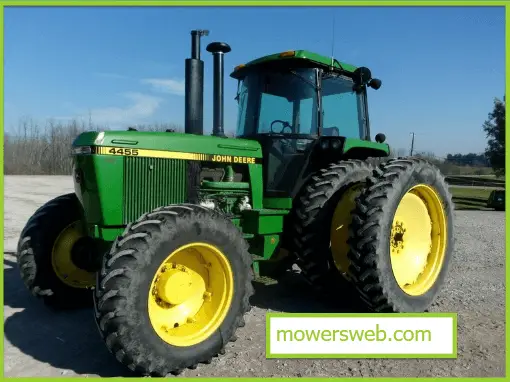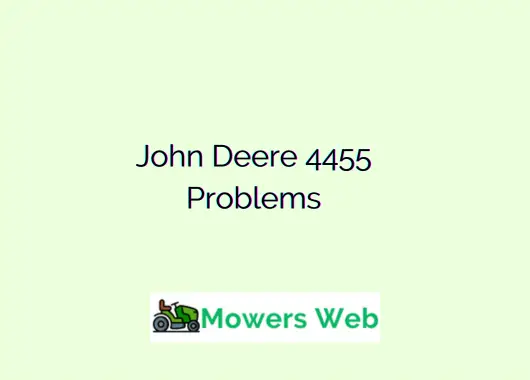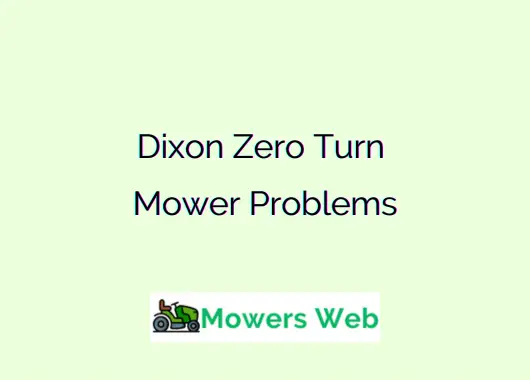John Deere 4455 Problems? When it comes to agricultural machinery, John Deere is a name that commands trust and reliability.
The John Deere 4455 tractor, in particular, has been widely regarded as a workhorse in the field, capable of tackling various farming tasks with ease.
However, like any complex machine, the 4455 is not without its issues.
In this post, we will explore some common problems faced by John Deere 4455 owners, provide troubleshooting tips, and emphasize the importance of regular maintenance to keep your tractor running smoothly.
Let’s jump in.

John Deere 4455 Problems
1. Engine trouble
The engine is the heart of any tractor, and the John Deere 4455’s engine is generally reliable.
However, some owners have reported issues such as difficulty starting, loss of power, or excessive smoke emissions.
These problems may stem from fuel system clogs, air filter issues, or injector malfunctions.
2. Hydraulic System Issues
The hydraulic system is critical for operating various attachments and implements.
Leakage, slow response, or unusual noises from the hydraulics can hinder productivity.
Regular inspections of hydraulic lines, fluid levels, and pump conditions are essential to preventing potential problems.
3. Electrical Problems
Electrical issues can be frustrating and hard to diagnose. Problems with the tractor’s lights, dashboard indicators, or starter may arise due to loose connections, faulty fuses, or a failing alternator.
Read 17 Common John Deere 4850 Problems(With Solutions)
4. Transmission and Gearbox Concerns
A faulty transmission can disrupt the tractor’s performance and lead to significant downtime. Gear slippage, difficulty shifting, or strange noises during gear changes are signs of transmission problems.
5. Cooling System Challenges
Overheating can cause severe damage to the engine and other components. Issues with the cooling system, such as leaks or malfunctioning fans, can lead to overheating and should be addressed promptly.
6. Steering and Braking Complications
The safe operation of the tractor depends on a well-functioning steering and braking system. Steering problems, like stiffness or excessive play, and brake issues, such as reduced stopping power, require immediate attention.
Read 9 Common John Deere 3032e Problems(With Solutions)
Troubleshooting Tips and DIY Solutions
1. Engine Maintenance and Inspection
Regularly check the air and fuel filters, injectors, and fuel lines. Clean or replace clogged filters, and address any fuel system issues promptly.
2. Hydraulic System Checks
Inspect hydraulic lines for leaks and check fluid levels regularly. If the hydraulic system is slow to respond, consider changing the hydraulic fluid and replacing filters.
3. Electrical System Diagnosis
Ensure all electrical connections are secure, and inspect fuses regularly. If lights or indicators are malfunctioning, test the corresponding components and replace them as needed.
Read John Deere Skid Steer Troubleshooting(5 Quick Ways To Fix)
4. Transmission and Gearbox Maintenance
Regularly check transmission fluid levels and inspect for leaks. If gears are slipping or shifting is problematic, consult a professional mechanic for further diagnosis and repairs.
5. Cooling System Care
Inspect the cooling system for leaks and ensure the radiator and fan are clean and functioning correctly. Regularly check coolant levels and replace coolant according to manufacturer guidelines.
6. Steering and Braking Inspections
Check the steering system for any signs of wear or damage, and address issues promptly. For brake problems, inspect brake fluid levels and replace worn brake pads or shoes.
Read 10 Common John Deere 185 Hydro Problems(With Solutions)
Importance of Regular Maintenance
Regular maintenance is crucial to keeping your John Deere 4455 running smoothly and preventing potential problems.
A well-maintained tractor not only ensures higher productivity but also extends the lifespan of the machine.
When to Seek Professional Help
While some minor issues can be resolved with DIY solutions, more complex problems may require professional expertise.
If you encounter persistent or severe problems with your John Deere 4455, it’s best to consult a qualified tractor mechanic.
Read John Deere SPN Codes(A to Z Codes)
Final Remarks
The John Deere 4455 is undoubtedly a reliable and powerful tractor, but like all machines, it is susceptible to problems.
By understanding common issues and performing regular maintenance, owners can keep their 4455 running at its best.
Remember to address problems promptly and seek professional help when needed to ensure optimal performance and long service life for your John Deere 4455.
Read John Deere 2010 Problems(5 Quick Ways To Fix)
FAQs
How can I improve the fuel efficiency of my John Deere 4455?
To enhance fuel efficiency, ensure regular maintenance of the engine, clean or replace air and fuel filters, and drive at consistent speeds.
What should I do if the engine overheats?
If the engine overheats, immediately turn off the tractor and allow it to cool down. Check for coolant leaks and ensure the radiator and fan are functioning correctly.
Is it normal for the hydraulic system to make noise during operation?
Some noise is normal, but excessive or unusual noises may indicate issues. Check hydraulic lines and fluid levels, and consult a professional if the noise persists.
Why does my tractor struggle to change gears?
Difficulty shifting gears may indicate transmission problems. Check the transmission fluid levels and consult a professional for further inspection.
How often should I replace the coolant in my John Deere 4455?
Coolant replacement intervals vary by manufacturer, but it is generally recommended to replace coolant every two to three years or as specified in the owner’s manual.




